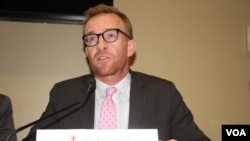Rights groups and the opposition party have renewed their calls for the United States to impose sanctions on Cambodia in the wake of a wide-ranging crackdown on political dissent.
The proposed sanctions include isolating Prime Minister Hun Sen’s government by placing further visa bans on officials and launching corruption investigations, they said.
The Supreme Court is set to rule in a political party dissolution case against Cambodia’s main opposition, the Cambodia National Rescue Party, next week.
Human Rights Watch’s Asia advocacy director, John Sifton, said the political situation in Cambodia now was “more frightening” than in previous years and that the international community should move to isolate Hun Sen on “the world stage and in Cambodia.”
“Isolating him as a pariah, isolating him economically in a sense that he could perhaps be sanctioned in various fora,” he told a seminar organized by the Heritage Foundation this week.
Hun Sen has held largely uncontested power in Cambodia since the early 1980s, but his Cambodian People’s Party did not do well in the general election in 2013 and local elections earlier this year, losing significant ground to the CNRP.
The electoral success of the CNRP is thought to have prompted the crackdown ahead of a scheduled general election next year.
Olivia Enos, a policy analyst at the Heritage Foundation, a right-wing think tank, said visa bans on officials could be the first step towards further sanctions against Phnom Penh.
“Congress has already taken leadership in the area of visa ban because the State-Foreign Operations bill has provisions in it,” she said.
A bill is currently under consideration in Congress that would put in place a visa ban and other travel restrictions on Cambodian officials.
“This is another area that the Trump administration could perhaps endorse this language and sort of getting movement fairly quickly,” Enos added.
The Senate’s State and Foreign Operations bill also calls for conditions to be placed on aid to Cambodia.
In recent months, the Cambodian government has shut down the US-funded National Democratic Institute’s office in Cambodia, closed down local radio stations for carrying Radio Free Asia and Voice of America’s programs, and suspended some local civil society organizations. Prime Minister Hun Sen has since increased his anti-US rhetoric.
“This matters to the United States,” said Randy Schriver, recently nominated Assistant US Secretary of Defense for Asian and Pacific Affairs. “It’s not just the 16 or 17 million people in Cambodia. It’s a matter that impacts us, impacts not only the bilateral relationship but has regional implications. The functionality of ASEAN could be affected.”
Kem Monovithya, CNRP deputy director general for public affairs, who also spoke at the event, said that Prime Minister Hun Sen’s actions were taken under the presumption that the world is no longer interested in Cambodia and no country would take any action against him.
She urged the US, Japan, and the EU to work together in salvaging Cambodia’s election, otherwise they will all “become accomplices in the destruction of democracy in Cambodia.”
“Every time the international community stands by the democratic movement in Cambodia, it works,” she said. “It works whenever you act, but it’s a matter of timing right now. We are running out of time and if there is no action by the end of this month, if the course is not reversed by the end of this month, then it is too late and you have yourself to blame for the ‘wait and see’ strategy.”
However, Walter Lohman, the Heritage Foundation’s director of its Asian Studies Center, is cautious about the opposition’s motives.
Lohman said the CNRP’s deal with Hun Sen after nearly one year of protests against the 2013 general elections results has hurt many players in the international community, who lent their support.
“We were pushing so hard and then suddenly we were alone and the guy who has most at stake had decided to compromise,” said Lohman. “So what do you think about that? Is that something we should worry about going forwards and are we going to push very hard on this and at the end of the day the opposition reaches some sort of deal?”
“You have to understand that the CNRP leadership is complex,” responded Kem Monovithya. “It’s a merger between two parties and decisions are not made by one person in particular. It’s not. It’s made by a consensus and agreement among a few people who sometimes have different opinions and sometimes one opinion ends up being the outcome of it and I think that was the case in CNRP making the deal with the Cambodian government then and that was not something that Kem Sokha supported.”
US Senator Ted Cruz has set a deadline of November 9 to release Kem Sokha or “face consequences”. But Cambodia has said the arrest of Kem Sokha does not “spell the end of pluralistic and democratic institutions in Cambodia.”







